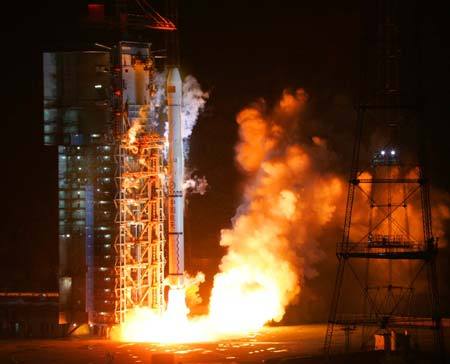VIII-4: Question: Is it true, as reported, that China is constructing a Compass satellite navigation system (a global navigation positioning network), which is expected to greatly improve China's ability in accurate attacking?
A: Compared with the United States' 24-satellite constellation Navstar Global Positioning System (GPS), China's current Compass satellite navigation system is just a preliminary one, with three geostationary Earth orbit satellites providing longitude and latitude (two operational, one for emergency), and a ground center to measure altitude for commercial use. Restrained by present technical levels and data accuracy, it is as yet unfit for military use.
The navigation system, a major component of China's space project, is favorable to China's national development and to the region at large. As a populous developing country, China owns a huge landmass and long coastal lines. In the late 1980s, China imported the first satellite global positioning receiver. Since then China's satellite navigation system initiative has been developing rapidly, making it one of the major users of the global satellite positioning system. As China makes advances in other spheres, its need for a self-developed satellite navigation system for independent R&D (and to meet growing domestic demands) also rises.
As a matter of fact, since 2000, China has successfully launched three experimental satellites, initially establishing China's proprietary satellite navigation and positioning system of the first generation. Different from the United States' highly accurate GPS, which has been controlled by its Defense Department for military use since it was born, China's Compass navigation system is open to civil and commercial use. The system includes at least 35 satellites, five geostationary Earth orbit and 30 medium Earth orbit satellites. In February of 2007, China sent its fourth experimental satellite to the preset orbit by another rocket carrier of the "Long March series". The existing four satellites enable the Compass navigation system to play a crucial role in offering services for transportation, meteorology, oil exploration, ocean expedition, forest fire prevention, disaster forecast, telecommunications, public security and other sectors that demand positioning of high accuracy.
The Compass navigation system is expected to have formidable economic and social effects. It is estimated that by 2008, there will be 300,000 users of this navigation and positioning system, with 3.5-billion-yuan direct profits produced, accounting for 20 percent of the total navigation and positioning industry. Additionally, the system is expected to produce tens of billions yuan through other byproducts along the industrial chain. By 2010, its total industrial output is expected to surpass 10 billion yuan.

(China.org.cn)